The Stephen Harper mystery .. will the real new Prime Minister of Canada stand up?
Feb 24th, 2007 | By Dominic Berry | Category: Ottawa Scene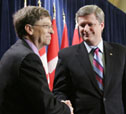 As February 2007 heads into its last wintry days, Stephen Harper has been the new Conservative minority prime minister of Canada for just over a year. And for at least the past few weeks he has seemed to be doing almost alarmingly well. Then, very recently, he has also been reminding many Canadian people yet again that in other ways he still adds up to bad news. John Ibbitson at the Globe and Mail, e.g., was the first biographer of Mike Harris’s later 1990s conservative surge in Ontario. You might guess that Mr. Ibbitson wants to like Mr. Harper. Yet on February 22 he couldn’t help lamenting “Harper’s baseless and base counterattack” in Parliament the day before. And even Don Martin in the Calgary Herald was reporting: “Harper hands Liberals club to pound his government.” In the end you can only keep wondering: Who really is Stephen Harper anyway? And how long can he last?
As February 2007 heads into its last wintry days, Stephen Harper has been the new Conservative minority prime minister of Canada for just over a year. And for at least the past few weeks he has seemed to be doing almost alarmingly well. Then, very recently, he has also been reminding many Canadian people yet again that in other ways he still adds up to bad news. John Ibbitson at the Globe and Mail, e.g., was the first biographer of Mike Harris’s later 1990s conservative surge in Ontario. You might guess that Mr. Ibbitson wants to like Mr. Harper. Yet on February 22 he couldn’t help lamenting “Harper’s baseless and base counterattack” in Parliament the day before. And even Don Martin in the Calgary Herald was reporting: “Harper hands Liberals club to pound his government.” In the end you can only keep wondering: Who really is Stephen Harper anyway? And how long can he last?
New Man from the West Who Really Does Have a Solution for Canada Today?
 Take the very best sides of Mr. Harper’s profile first. Even if you do not like him at all, there have been a few points over the past year where he has acted like a smart guy who actually is interested in the Canadian future. And at these points he has almost seemed to have a few practical ideas about how to better secure and improve this future – along with the strategic cunning and raw political will to force them through the traditional maze of smoke and mirrors in Ottawa.
Take the very best sides of Mr. Harper’s profile first. Even if you do not like him at all, there have been a few points over the past year where he has acted like a smart guy who actually is interested in the Canadian future. And at these points he has almost seemed to have a few practical ideas about how to better secure and improve this future – along with the strategic cunning and raw political will to force them through the traditional maze of smoke and mirrors in Ottawa.
In bad as well as good senses Stephen Harper is no Pierre Trudeau. But as John Ibbitson has just explained, he is something of “a libertarian intellectual.” He was born and grew up in Toronto, moved to Calgary and made his adult career there, speaks plausible French, and has learned a few things about Ottawa up close. As shaky as he may still be on subjects like China, he has spent his entire career in Canada, and he is intimate with Canadian problems. Someone who can more or less casually allude in public to the “unique history and eclectic identity of this country,” as Mr. Harper did this past fall, at least has some kind of focused vision of what he is up against.
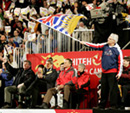 These very best sides of the new Prime Minister Stephen Harper have arguably made a few encouraging and even promising moves on three or perhaps two-and-a-half particular fronts. The first is Quebec (and the wider French Canada), and its role in the confederation of the 21st century. (Quebecers are, as Mr. Harper noted recently, “the first people who called themselves Canadians” and crucial to the country’s future.) The second is the long-term democratic reform of the Senate of Canada – which Mr. Harper has again aptly termed “a 19th century relic” (that weakens the heart of the Canadian Constitution today, and desperately needs renovation).
These very best sides of the new Prime Minister Stephen Harper have arguably made a few encouraging and even promising moves on three or perhaps two-and-a-half particular fronts. The first is Quebec (and the wider French Canada), and its role in the confederation of the 21st century. (Quebecers are, as Mr. Harper noted recently, “the first people who called themselves Canadians” and crucial to the country’s future.) The second is the long-term democratic reform of the Senate of Canada – which Mr. Harper has again aptly termed “a 19th century relic” (that weakens the heart of the Canadian Constitution today, and desperately needs renovation).
The one essential point here is not that Mr. Harper’s current (and even somewhat slippery) policy ideas on either of these longstanding key Canadian problem areas are all that striking, or even likely to work in the end. It is just that, virtually alone among Canadian political leaders today, he is actually prepared to at least start trying to make some practical progress on these issues now – in full recognition of all the usual difficulties involved. (Another of his finer moments over the past several months went something like: “When Champlain came here he didn’t say, oh this is just too hard. It’s too cold and there’s too much snow. He just got on with it,” etc.) And some of Mr. Harper’s ideas about the process of getting from here to there, ultimately, do seem somewhat fresh and constructive (regardless of your exact personal hopes for just where there will ultimately prove to be), and worth giving some stab at an honest chance.
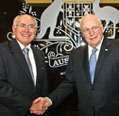 The third or second-and-a-half area of this sort involves the broad policy approach of “Canada’s new government” to military force. Strictly from the rawest standpoint of Canadian sovereignty, the running down of the country’s military capacity that had been going on in Ottawa for perhaps as long as half a century had lately touched bottom. Paul Martin’s Liberals had arguably enough already begun the long march back. But Stephen Harper’s Conservatives have injected new positive feelings into the enterprise. And this has not been without some virtue, in a clearly quite troubled global village of the early 21st century.
The third or second-and-a-half area of this sort involves the broad policy approach of “Canada’s new government” to military force. Strictly from the rawest standpoint of Canadian sovereignty, the running down of the country’s military capacity that had been going on in Ottawa for perhaps as long as half a century had lately touched bottom. Paul Martin’s Liberals had arguably enough already begun the long march back. But Stephen Harper’s Conservatives have injected new positive feelings into the enterprise. And this has not been without some virtue, in a clearly quite troubled global village of the early 21st century.
(Yet it only accounts for half and not a whole very best side, because Stephen Harper has also gone overboard on the already established Chretien-Martin Canadian mission to Afghanistan – in the, hopefully, now obsolete too “militarist” style of Dick Cheney and George W. Bush, and John Howard in Australia. And then Mr. Harper seems to have at least implicitly encouraged General Rick Hillier to go overboard in some recent inappropriate public remarks about Canadian military policy too. In the end Canada cannot finally have a military policy anywhere that the Canadian people do not support – just as the United States cannot finally have a military policy that the American people do not support. And, e.g., how many troops do we want in places like Afghanistan, compared with how many troops we want in our own far north, defending Canadian Arctic sovereignty, as Mr. Harper has also attractively promised he will do?)
Mean and Nasty Right-Wing Tribal Warrior Who Will Finally Drag the Rest of the Country Down with Him?
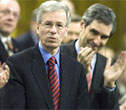 After missing the rising tide on environmental policy this past fall (and knowing that new Liberal leader Stephane Dion was primed to pounce on this front too), Stephen Harper came out of the box much more brilliantly when Parliament reconvened at the end of January 2007. And his brilliance shone especially brightly, when he skillfully blended all of the environment, Quebec, and the so-called federal-provincial fiscal imbalance in his new $1.5 billion “Eco Fund.” Some will wisely enough say $1.5 billion is not really all that much money these days. (L. Paul Bremer lost considerably more as pocket change in Iraq.) But if ardent environmentalists still don’t trust Canada’s new government, the latest opinion polls seem to suggest that Mr. Harper has gained some green ground among the Canadian people who finally cast the decisive ballots in elections.
After missing the rising tide on environmental policy this past fall (and knowing that new Liberal leader Stephane Dion was primed to pounce on this front too), Stephen Harper came out of the box much more brilliantly when Parliament reconvened at the end of January 2007. And his brilliance shone especially brightly, when he skillfully blended all of the environment, Quebec, and the so-called federal-provincial fiscal imbalance in his new $1.5 billion “Eco Fund.” Some will wisely enough say $1.5 billion is not really all that much money these days. (L. Paul Bremer lost considerably more as pocket change in Iraq.) But if ardent environmentalists still don’t trust Canada’s new government, the latest opinion polls seem to suggest that Mr. Harper has gained some green ground among the Canadian people who finally cast the decisive ballots in elections.
Cut off at this pass, the Dion Liberals in Parliament have lately been trying to provoke the over-aggressive Harperian right-wing values, for which there almost certainly is no Canada-wide popular majority, by attacking the Harper government’s recent changes to the federal judicial appointments’ process (to include, e.g., police representatives on the committees that help appoint judges, as a boost to the forces of coercive law and order in the judicial system). The Grits were struggling somewhat vainly with this as yet rather ethereal mission for a few weeks. And then they struck pay dirt on Wednesday, February 21, when: “The Commons exploded with insults and innuendo … as Prime Minister Stephen Harper accused Liberals of derailing the RCMP’s investigation of the 1985 Air India bombing by opposing the government’s plan to extend investigative hearings, an Anti-Terrorist Act measure set to expire next week.”
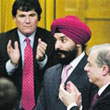 As John Ibbitson has explained at greater length: “The Canadian Judicial Council has warned in a communiqu that it will withdraw from the committees that vet judicial applicants, if the Tories use those committees to stack the courts … Such criticism from the bench is extraordinary, so it’s hardly surprising that the Liberals demanded in Question Period that the government listen … But Mr. Harper never defends against an attack. Instead, he counterattacks with greater force. Rather than answer the judges’ criticism, the Prime Minister alluded to a story in the Vancouver Sun, which said that the father-in-law of Liberal MP Navdeep Bains might be the subject of an investigative hearing, as part of the Air-India investigation.”
As John Ibbitson has explained at greater length: “The Canadian Judicial Council has warned in a communiqu that it will withdraw from the committees that vet judicial applicants, if the Tories use those committees to stack the courts … Such criticism from the bench is extraordinary, so it’s hardly surprising that the Liberals demanded in Question Period that the government listen … But Mr. Harper never defends against an attack. Instead, he counterattacks with greater force. Rather than answer the judges’ criticism, the Prime Minister alluded to a story in the Vancouver Sun, which said that the father-in-law of Liberal MP Navdeep Bains might be the subject of an investigative hearing, as part of the Air-India investigation.”
As Mr. Ibittson goes on: “The Liberals [Mr. Harper himself suggested] want those hearings stricken from the anti-terrorism legislation. The Tory implication was clear: The Liberals don’t care about defending against terrorism, or getting to the bottom of the Air-India debacle. They’re just trying to protect one of their backbenchers … The accusation is both base and baseless and lends credence to Liberal Leader Stphane Dion’s fears the hearings could be used for witch hunts … Liberal House Leader Ralph Goodale, who was himself the victim of a Tory smear over alleged insider trading involving income trusts, went ballistic. How low, he wanted to know, is the Prime Minister prepared to go? The answer: as low as necessary to fight off the Central Canadian establishment’s efforts to bring the Tories down.”
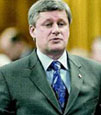 In a few minds the great crusade against the Central Canadian establishment (which seems to be doing Central Canada very little good lately, btw) might slightly justify Prime Minister Harper’s latest near-paranoid troll through the gutter here. But in the end even Don Martin of the Calgary Herald felt obliged to report that: “He just can’t help himself. …The leader who talked himself into trouble over Alberta firewalls and Atlantic Canada’s ‘culture of defeat’, the one who derailed his election chances late in the 2004 campaign and almost blew the winning conditions on the eve of the 2006 vote was back in fine self-immolation form Wednesday.”
In a few minds the great crusade against the Central Canadian establishment (which seems to be doing Central Canada very little good lately, btw) might slightly justify Prime Minister Harper’s latest near-paranoid troll through the gutter here. But in the end even Don Martin of the Calgary Herald felt obliged to report that: “He just can’t help himself. …The leader who talked himself into trouble over Alberta firewalls and Atlantic Canada’s ‘culture of defeat’, the one who derailed his election chances late in the 2004 campaign and almost blew the winning conditions on the eve of the 2006 vote was back in fine self-immolation form Wednesday.”
Set this beside the latest gross and over-the-top TV attack ads from the perhaps a little too bulging Conservative coffers – against Stephane Dion’s alleged lack of leadership qualities, and in the midst of what is still not supposed to be any kind of election campaign. And you start to remember all the other over-aggressive and vaguely paranoid right-wing pronouncements in the now rather long career of Stephen Harper. Then you remember the sorry spectacle of the very low and down-in-the-gutter Conservative opposition leader a few years back, screaming in Parliament about how Paul Martin’s personal political career was “going down the toilet.” And you remember that even though Mr. Harper has been trying to do some higher-minded and necessary things about Quebec and Senate reform (or even the Canadian military), he is also still too small-minded to confront the equally important fundamental problems of the aboriginal peoples of Canada – even in the measured way that Paul Martin did (however accurately Mr. Harper may have predicted the ultimate trajectory of Mr. Martin’s personal career).
 From here it is easy enough to conclude once again that, when absolutely everything is said and done, the Harper Conservatives finally are just a somewhat more polite Dick Cheney and George W. Bush North – headquartered in the Alberta outpost of the Texas oil patch. (And this is of course especially true if you happen to live east of the Lake of the Woods, where the Central Canadian establishment nowadays seems more like a good old joke than anyone’s serious antagonist. And besides, as John Ibbitson notes, Stephen Harper’s “Conservatives have Bay Street” in Toronto already: so what is the big east-west fight really all about – granting that it certainly must be all about something?)
From here it is easy enough to conclude once again that, when absolutely everything is said and done, the Harper Conservatives finally are just a somewhat more polite Dick Cheney and George W. Bush North – headquartered in the Alberta outpost of the Texas oil patch. (And this is of course especially true if you happen to live east of the Lake of the Woods, where the Central Canadian establishment nowadays seems more like a good old joke than anyone’s serious antagonist. And besides, as John Ibbitson notes, Stephen Harper’s “Conservatives have Bay Street” in Toronto already: so what is the big east-west fight really all about – granting that it certainly must be all about something?)
In some parts of the country at least, Stephen Harper even nowadays at best still seems quite a lot like Dr. Jekyll and Mr. Hyde. And whenever it altogether seriously starts to appear that Dr. Jekyll definitely has some strong points, and maybe does deserve a bit more of a chance to work his magic on all of the resources Ottawa commands (even with a majority government say?), the “misanthropic … solitary, violent man called Hyde” suddenly enters the TV room to remind us that there really is another more unsettling side of the story too. And then you suddenly remember yet again the ancient folk wisdom of the near-great old North-American-Canadian-populist historian Frank Underhill (reputed author of both the “Regina Manifesto” and In Search of Canadian Liberalism ): “Canadians always vote Democratic in American elections.”

